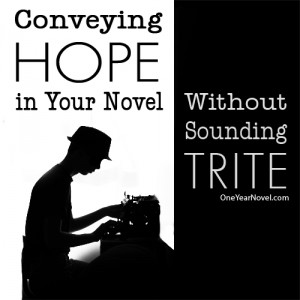Conveying Hope in Your Novel without Sounding Trite
This guest post by Kyle de Waal is part 2 of “The Cross and the Typewriter.” For part 1, Facing the Christian Fiction Stigma, read here »
 Two Sided-Coin
Two Sided-Coin
In my last post, I argued that Christian fiction is not fiction confined by generic constructs, but fiction written from the soul of the Christian. In particular, I focused on ideals like hope, which the Christian intrinsically connects to the hope we have because of the sacrifice of Christ.
However, these ideals do not exist within a vacuum, and taken as a part of the greater kaleidoscope of life, their very existence implies more about the rest of the world. Why hope? What is the world like if we must hope for things rather than simply have them? Why freedom? What is this freedom from?
In the Christian worldview, it is clear that evil will not win in the end, and good is not somehow dependent on evil. Evil will be vanquished and good will live on. However, we also know that if we look around at the world around us, evil is still present. Jesus’ victory has been won, but we still see the fallout that sin has in the world.
The Reality of Pain
We still live in a world where pain and suffering seem to be all but omnipresent. Scrolling through any news website provides more than enough fodder for the argument that humans are capable of committing any evil to each other.
Where do we find hope in that? Wouldn’t any message of hope seem trite against the backdrop of actual human experience?
This is a question that I’ve grappled with a great deal since first starting to seriously think about my writing, and I am not in a position to argue that I have it all figured out and I can come down from the mountain and share the good news with all of you.
To face reality we have to face the evil that occupies real life. And when you sink deep enough into the mire, revealing the reality of what happens every day, how do you express that hopefully?
The Modern Disease
I think this is where a lot of serious modern literature ends on a note of nihilism or absurdism. The nihilistic writers do an excellent job diagnosing the diseases of the modern age, but they cannot take it a step farther. And, if a story is unwilling to face reality, as in absurdist literature, it becomes fluff, refusing to treat the tangled knot of life as anything but a joke, because jokes are safe.
Both of these paths are profoundly unsatisfying for me. Can I really only gloat over leaving my audience sad and hopeless or refuse to open my eyes and just make things blow up in flashy, entertaining ways?
The books that stick with me are the books that do look at the world seriously, even if they do so against the backdrop of orcs or spaceships. But tragically often, looking at the world seriously means seeing the problems it has and presenting them for everyone else to see. Nothing more.
I think as Christians we are asked to do that and take it a step further too. We can’t just prop up good and tell the world that it will defeat evil. That won’t ring true. But I don’t think we should just settle for establishing that evil is real either, or stop after saying that the world is broken. Because we know the whole story. We know about that inciting incident with a tree, a garden, and two humans. We know that black moment when a spotless lamb was sacrificed.
If we stop telling the story with an innocent man nailed to a cross, our words might be believed, because it is not hard to believe that we live in a world where evil would destroy someone who did no wrong. It’s easy to believe that justice could be perverted.
Tell the Whole Story
As Christians, we’re aware of what we were saved from, but what good do we accomplish if we cut the story short before we get to the saving?
Looking evil in the face and acknowledging it is scary and hard, and sometimes it does feel like evil will strangle out any good there is. But we know there’s more to the story than that.
We can see all of the chaos and all of the tragedy escape from Pandora’s box to assault the world. But we also know that after all that’s been done, hope remains.
How does this translate to our writing? As with anything else, it will vary from story to story. You don’t need to end every novel with Aslan on the stone table to send the message that Christ has beaten death. Approaching this topic will require thought and will probably require a lot of effort. However, I can offer two broad generalities.
The first thing that I find helpful to remember is that we are not the first writers ever to try this, and there is a whole bank of stories to help us hone our own. JRR Tolkien, for instance, reminds us of the beauty of the natural world and the pleasure of tranquillity. Lewis’ chilling The Screwtape Letters offers a look at demons, but also shows the hope Christians have to overcome.
If you really think about the stories that have touched you, you may find examples to help you deal with this complicated tangle.
Secondly, remember that suffering is no more real than pleasure and evil is not more realistic than good. It is not unrealistic to end your story on a happy note, because plenty of stories in real life do end that way. Sometimes this is on a grand scale, like the wonderful ending to the Cold War, when humanity wasn’t eradicated even though it totally could have been. Sometimes this will just be a small thing, like the fact that there are people who get married and actually live happily together.
Hope and beauty are everywhere, mingled with the discouragement and foulness. Because we know hope we don’t need to settle for discouragement. If we really believe the whole story of the cross and accept that it didn’t end with a victory for evil, why should we hold back from telling it that way in our art?
…
What books are an example to YOU of conveying hope without sounding trite?
…
About Kyle
Kyle de Waal is a long-time OYANer and veteran contest submitter. When his college and work schedules allow, he contrives mysteries and tries to pin them down and transform them into novels. If new ideas aren’t vying for his attention, his lengthy superhero novel is always waiting to soak up his time like a sponge. Kyle is working towards a major in English, but he dreams of adding a minor in Greek and Roman Studies, his second academic passion.
Those of you who are on the OYAN student forum, can find his contest-winning novel, Project Theta, in the 2011 contest showcase.



That was awesome, Kyle, thank you 🙂
The Restorer (and the Restorer’s Son and the Restorer’s Journey) is, I think, a pretty good example. Also, the Auralia Thread series too (starting with Auralia’s Colors). Both of those are really good books.
Wonderful post, and I agree. There’s a balance there. I guess it could be summed up into the whole “show don’t tell” thing–you can’t just end a story with the moral stated flat out. It’s better if you can come up with a way to show the hope, even if it’s mixed with the pain of the world. It’s something I’m always working on. Thanks for your thoughts.
Great point. Christian fiction is fiction written by the soul of a christian. Simple, but true. Thanks Kyle.
Excellent topic. We should discuss it the next time we talk. I know I tend to favor the darker side of things in my stories.